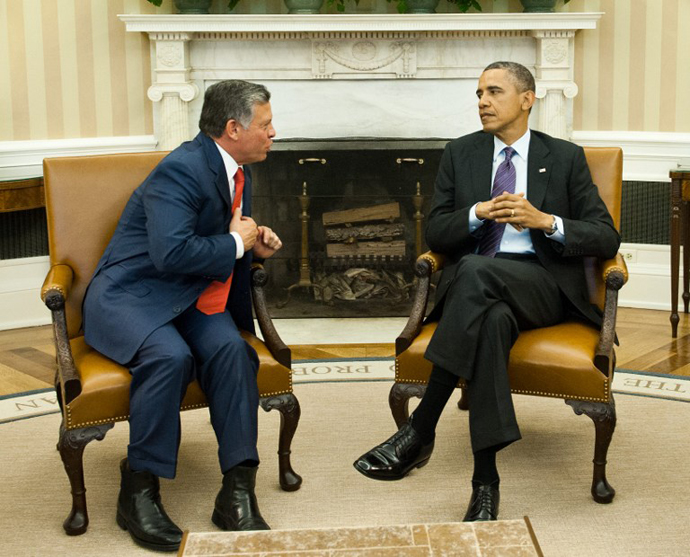Chemical Weapons Inspection in Syria stalled: UN Team Takes Orders from Washington, “Cannot be Trusted”
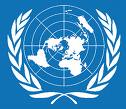
Without hard evidence, American accusations of chemical weapons use in Syria fall short of UN proof standards, says a UN chemical inspector. And in the way proposed, a probe would only result in an Iraqi scenario, the Syrian information minister told RT. The anti-Assad lobby in the UN is using the chemical weapons scare as a new way to exert political and economic pressure on the Syrian government, the country’s information minister Omran Ahed al-Zouabi told RT.
“First of all, I want to confirm that statements by the US Secretary of State and British government are inconsistent with reality and a barefaced lie,” he told RT. “I want to stress one more time that Syria would never use it – not only because of its adherence to the international law and rules of leading war, but because of humanitarian and moral issues.”
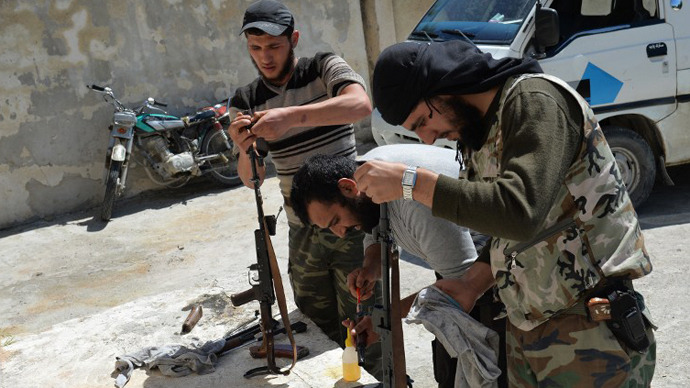
Syria itself made the official request to the UN to investigate the incident in Khan al-Assal, which is an “important and brave step,” al-Zouabi stressed.
“It proves once again that the whole policy of the Syrian government is targeted against use of any kind of weapons of mass destruction by anybody: terrorists, Israel or any other neighboring state,” he said.
The United States pretends that there are no terrorists acting on Syrian territory at the same time being a country “involved in the biggest terror acts in the world,” the minister claimed. “The US is concealing that Qatar is financing terrorists, supply weapons to them. Thus, the US is basically involved in what is happening in Syria.”
‘Iraqi scheme of inspections’
In all their “absurdity and deceitfulness,” al-Zouabi explained, such statements by some Western governments are made in pursuit of basic goals.
“Their aim is, first, to cover those who are really behind use of chemical weapons in Khan al-Assal, and secondly, to repeat Iraq’s scenario, to pave the way for other investigation inspections. To provide, based on their results, maps, photos of rockets and other fabricated materials to the UN, which as we know, opened the way to the occupation of Iraq.”
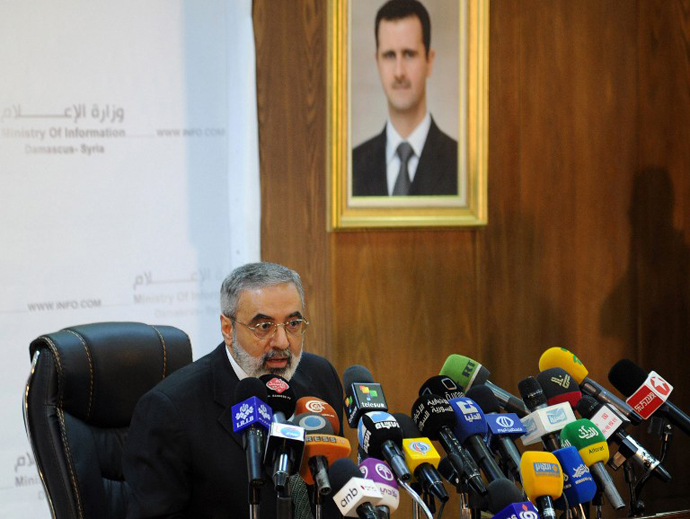
Russian foreign ministry spokesman Aleksandr Lukashevich meanwhile said that the UN Secretary-General’s initial positive reaction to Syria’s appeal for an investigation“underwent a drastic change under the influence of a number of states.”
“The management of the UN Secretariat demanded that Damascus agree to the establishment of a permanent mechanism for inspection throughout Syrian territory with unlimited access to everywhere,” Lukashevich explained.
“The proposed scheme of inspections is similar to those used at the end of the last century in Iraq, which, unlike Syria, was under UN sanctions.” After months of silence, the UN is now referring to information from France and Britain about other cases of alleged use of chemical weapons last year, which Lukashevich believes demonstrates a highly politicized approach.
“It’s difficult to understand why leaders of the UN Secretariat preferred to follow those who are concerned not about exact steps towards the suppression of use of chemical weapons in the Syrian crisis, but about changing the ruling regime of a sovereign state.”
Inspectors on standby
The United Nations again pushed on Thursday for unconditional and unfettered access for its team of investigators, which has been on standby in Cyprus since Syria refused it access nearly three weeks ago.
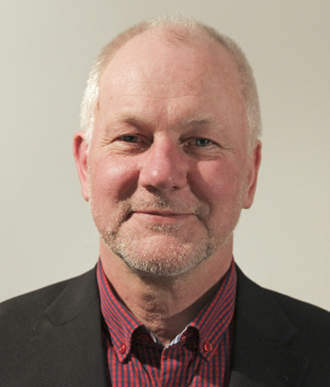
“We do not trust the American and British experts from a political point of view,” al-Zouab explained. “We also do not trust their qualifications. Their aim is to juggle with facts.”
“We won’t mind if Russians would be among the experts, quite the contrary, we only welcome this idea. We are quite sure in their high qualification and ability to clearly see into such matters.”
Experts from Russia and China however were not included in the team to ensure it wasn’t biased, according to the United Nations.
At the time Russian EU envoy Vitaly Churkin criticized “this kind of logic,” saying in that case he “would recommend excluding all NATO countries too.” Syrian officials maintain that they are ready to accept “a neutral and honest technical team to visit the village of Khan al-Assal” in the province of Aleppo.
The Syrian opposition meanwhile is also dead set against the inclusion of Russian and Chinese experts in the investigation team.
“The Russian side has no status allowing it to conduct a fair and impartial criminal investigation,” the Syrian National Council said in a statement, because Russia “is a major supplier of conventional and strategic weapons to the Syrian regime, as well as the main political guarantor of it staying in power.”
“The UN needs to immediately investigate the use of chemical weapons in Syria,” an anonymous member of the council told AFP. “Should it find the regime used such weapons, it must act immediately, at least by imposing a no-fly zone.”
No samples whatsoever
Whether or not illegal chemical agents were used by either side during the Syrian conflict can only be determined by analyzing samples collected at the scenes of alleged attacks, said the Hague-based Organisation for the Prohibition of Chemical Weapons (OPCW), which despite not being a United Nations body, collaborates with the UN on such inspections.
None of the governments and intelligence agencies accusing Damascus of using chemical weapons have presented any of the evidence that would be required for a clear analysis, such as soil, blood, urine or tissue samples, said Michael Luhan, a spokesman for OPCW.

But even if samples were provided, the OPCW would never get involved in testing something that its own inspectors did not “gather in the field” because of the need to “maintain a chain of custody of samples from the field to the lab to ensure their integrity,” said Luhan.
“This is the only basis on which the OPCW would provide a formal assessment of whether chemical weapons have been used.”
Meanwhile, waiting for a green light to enter Syria, members of the UN team “have been collating and analyzing the evidence and information that is available to date from outside,” Martin Nesirky, a spokesman for UN Secretary-General Ban Ki-moon, said on Friday.
‘US retains the ability to act unilaterally’
“With varying degrees of confidence” the American intelligence community has determined that “the Syrian regime has used chemical weapons,” US Defense Secretary Chuck Hagel announced on Thursday.
Giving the statement added significance, early afternoon on Friday, White House press secretary Jay Carney announced that the Obama administration has a number of options in regards to handling such reports – including direct use of military force – and that United States retains the ability to ‘act unilaterally’ in choosing one.
Just hours later, President Obama himself said, “horrific as it is…to use potential weapons of mass destruction on civilian populations crosses another line with respect to international norms and international law.” His remarks came after a meeting with Jordan’s King Abdullah in the Oval Office, amid mass demonstrations against deployment of US troops on Jordanian border with Syria.
